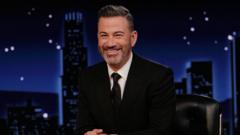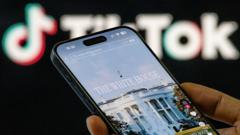Should TV Networks Facing Trump’s Criticism Lose Their Licenses?

Published: 2025-09-18 21:20:16 | Category: world
In a heated debate over free speech and accountability, US President Donald Trump has suggested that certain television networks, including ABC, should have their broadcasting licences revoked following the suspension of comedian Jimmy Kimmel. This suspension came after Kimmel made controversial remarks linking a murder to the political right, which drew backlash and led to regulatory scrutiny from the Federal Communications Commission (FCC).
Last updated: 10 October 2023 (BST)
Key Takeaways
- Jimmy Kimmel was suspended by ABC after making comments about the murder of conservative influencer Charlie Kirk.
- President Trump supported the FCC's actions against networks he believes provide biased coverage.
- The incident has sparked debate over free speech and accountability in the media.
- Kimmel's remarks were deemed offensive by some, prompting reactions from various political figures.
- Former President Barack Obama condemned the suspension, linking it to cancel culture.
The Controversial Remarks
During a recent episode of "Jimmy Kimmel Live!", Kimmel suggested that the suspect in the murder of Charlie Kirk was a supporter of the "Maga gang", a term used to describe staunch supporters of former President Trump. However, authorities later stated that the alleged gunman was influenced by "leftist ideology". This contradiction has heightened tensions over the narrative surrounding the incident.
ABC's Response and Suspension
Following Kimmel's remarks, ABC announced his suspension "indefinitely". The decision was made amid the FCC's threats of regulatory action against the network. This move has raised questions about the implications of censorship and the responsibilities of broadcasters in relation to public discourse.
Trump's Comments on Media Licences
While speaking to reporters aboard Air Force One, President Trump remarked that media outlets often portray him negatively, stating that they are "97% against me". He suggested that perhaps these networks should face consequences, including the potential revocation of their broadcasting licences. This statement underscores his long-standing criticism of the media and its influence on public opinion.
Reactions from the FCC and Other Media Outlets
The FCC chairman, Brendan Carr, supported the suspension, stating that they would continue to hold broadcasters accountable to the public interest. He indicated that the suspension of Kimmel was not an isolated event, implying that further action could be on the horizon for other networks that fail to adhere to these standards.
The Impact of Kimmel's Suspension
Kimmel's comments and subsequent suspension have ignited a firestorm of debate surrounding the concepts of free speech and accountability in media. Critics of the suspension include former President Obama, who labelled it an example of "cancel culture". Obama stated that the current administration's regulatory threats constitute a dangerous precedent for media freedom.
Support and Opposition to Kimmel's Suspension
While many prominent figures, including actors and media professionals, have condemned Kimmel's suspension, there are also those who argue that his remarks warranted accountability. Dave Portnoy, founder of Barstool Sports, stated that consequences for offensive comments are not indicative of cancel culture but rather a natural response to public outrage.
Public Responses and Broader Implications
Public figures and organisations have weighed in on the implications of Kimmel's suspension. The Writers Guild of America and the Screen Actors Guild both condemned the decision, framing it as a violation of constitutional free speech rights. In contrast, others, including British presenter Piers Morgan, argued that Kimmel's misleading comments about Kirk's murder led to justified outrage.
The Legal Landscape and Future Considerations
The legal ramifications of the FCC's actions and the broader implications for media regulation remain uncertain. As the debate unfolds, it is crucial to consider how the balance between free speech and accountability is navigated in a politically charged environment. The ongoing discussions highlight the complexities of media ethics and the responsibilities of broadcasters to their audiences.
Conclusion
The suspension of Jimmy Kimmel by ABC has ignited a significant dialogue about free speech, accountability, and the role of media in shaping public discourse. As events unfold, the future of broadcasting regulations and the responsibilities of networks will likely remain at the forefront of national conversation. How this incident will influence the landscape of media remains to be seen.
FAQs
What led to Jimmy Kimmel's suspension from ABC?
Jimmy Kimmel was suspended due to remarks he made linking a murder to political affiliations, which sparked backlash and prompted regulatory scrutiny from the FCC.
What did President Trump say about media licences?
President Trump suggested that networks providing negative coverage might deserve to have their broadcasting licences revoked, in light of Kimmel's suspension.
How did the FCC respond to Kimmel's comments?
The FCC chairman supported Kimmel's suspension and indicated that the commission would continue to hold broadcasters accountable for their content.
What is the significance of the term 'cancel culture' in this context?
Cancel culture refers to the practice of withdrawing support for individuals or companies after they have said or done something considered objectionable. In this case, critics view Kimmel's suspension as an example of this phenomenon.
What are the implications for free speech in the media?
This incident raises questions about the balance between free speech and accountability in media, particularly when comments are perceived as offensive or misleading.



